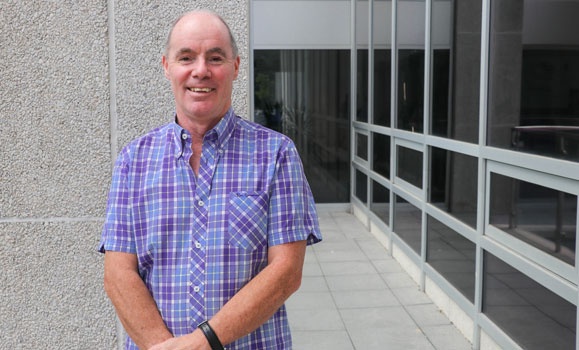Policy impact is an integral part of the fabric of the Schulich School of Law. Our work is grounded in shaping public policy through interdisciplinary, collaborative research that has a positive, real-world impact beyond the law school. Today, we’re looking at Professor Richard Devlin’s work in legal ethics, and how it’s helping to shape the regulation of legal professionals in Canada.
Every¬†individual and institution needs¬†to¬†be subject to¬†mechanisms of accountability. Judges are no different.¬†Professor Richard Devlin¬†examined¬†this¬†issue¬†as¬†co-editorŐż≤Ļ≤‘ĽŚ co-author¬†of¬†the 2017¬†book¬†Regulating Judges: Beyond Independence and Accountability, which¬†provides a framework that identifies multiple variables for the assessment of an effective and legitimate judiciary.¬†
‚ÄúAn important¬†way to¬†conduct¬†that assessment¬†is to consider different ways in which jurisdictions establish,¬†support,Őż≤Ļ≤‘ĽŚ regulate their judiciaries,‚ÄĚ says Devlin, whose¬†policy work has¬†mostly¬†focused on¬†the¬†regulation of¬†the legal profession and the judiciary.¬†His¬†research attempts to hold those who exercise power to standards of accountability, transparency, and equality.¬†‚ÄúA thriving and mature democracy requires openness and innovation,Őż≤Ļ≤‘ĽŚ academics hold the public trust to improve responsibleŐż≤Ļ≤‘ĽŚ responsive¬†governance.‚Ä̬†
In 2011, Devlin was the founding president of the Canadian Association of Legal Ethics/Association canadienne pour l’éthique juridique (CALE/ACEJ), where he currently chairs the board. Recently CALE/ACEJ has been making submissions to the Canadian Judicial Council on revisions to the Ethical Principles for Judges. One vital topic is whether this document should be given the status of an enforceable code of conduct or remain just a set of aspirational guidelines. 
As faculty, we have the privilege and benefit of academic freedom, and this imposes a responsibility on us to promote the public interest in the regulation of Canadian judges and lawyers.
Another particularly hot topic is the issue of judges returning to practice after retirement, which has been catapulted into the limelight by the SNC-Lavalin affair. The issue at play is that while at one level they are retired and they should be free to do as they wish, another is that they are using the credential of being a judge to maximize their own and their clients’ self-interest.
Devlin’s research extends deeply into the Canadian legal profession’s codes of conduct. As a member of the Nova Scotia Barristers’ Society’s Code of Ethics Committee, he contributed to the Federation of Law Societies of Canada’s Model Code of Professional Conduct, as well as Nova Scotia’s Code. 
ĪŠĺĪ≤űŐż∑…ī«įýįžŐż∑…ĺĪ≥Ŕ≥ů Professor Colin Jackson and Brent Cotter of the University of Saskatchewan‚Äôs College of Law on the duty¬†of loyalty has influenced the Conflicts of Interest¬†chapter of the NSBS‚ÄôsŐż≤Ļ≤‘ĽŚ the Federation of Law Societies of Canada‚Äôs Codes of Conduct.¬†He¬†has¬†also¬†collaborated with Professors Jocelyn¬†DownieŐż≤Ļ≤‘ĽŚ Sheila Wildeman on¬†successfully arguing for changes to be made to¬†the Duty to Report section of¬†the Codes of Conduct¬†to eliminate stigmatizing references to mental disability.
‚ÄúAs faculty, we¬†have the privilege and benefit of academic freedom, and this imposes¬†a responsibility¬†on us to promote the public interest in the regulation of Canadian judges and lawyers,‚ÄĚ says¬†Devlin.¬†‚ÄúYou fight the battles that you think you can win. There‚Äôs no predictability in progress, but¬†you have to¬†continue to engage with a sense of optimism.‚ÄĚ
Recent News
- Michael Karanicolas Joins Schulich Law as James S. Palmer Chair in Public Policy and Law
- DLAS Community Legal Worker Sydnee Blum ft in "Tenants fight eviction from Halifax apartment building"
- Professor Elaine Craig ft in "2024: The year as told through some of Dal’s biggest stories"
- Professor Emeritus Wayne MacKay & Associate Professor Naiomi Metallic ft in "The Personal Toll of Canada’s Broken Fishing Promises"
- Associate Professor Olabisi D. Akinkugbe ft in "Idigbe Celebrates Father’s 100th Birthday with Commissioning of PAS World Centre"
- Professor Emeritus Phillip Saunders ft in "What is the best way to resolve maritime dispute?"
- Preparing to Get LAWST AT SEA
- Assistant Professor Andrew Flavelle Martin cited in "Supreme Court of Canada Judgement re: Quebec (Attorney General) v. Pekuakamiulnuatsh Takuhikan"

